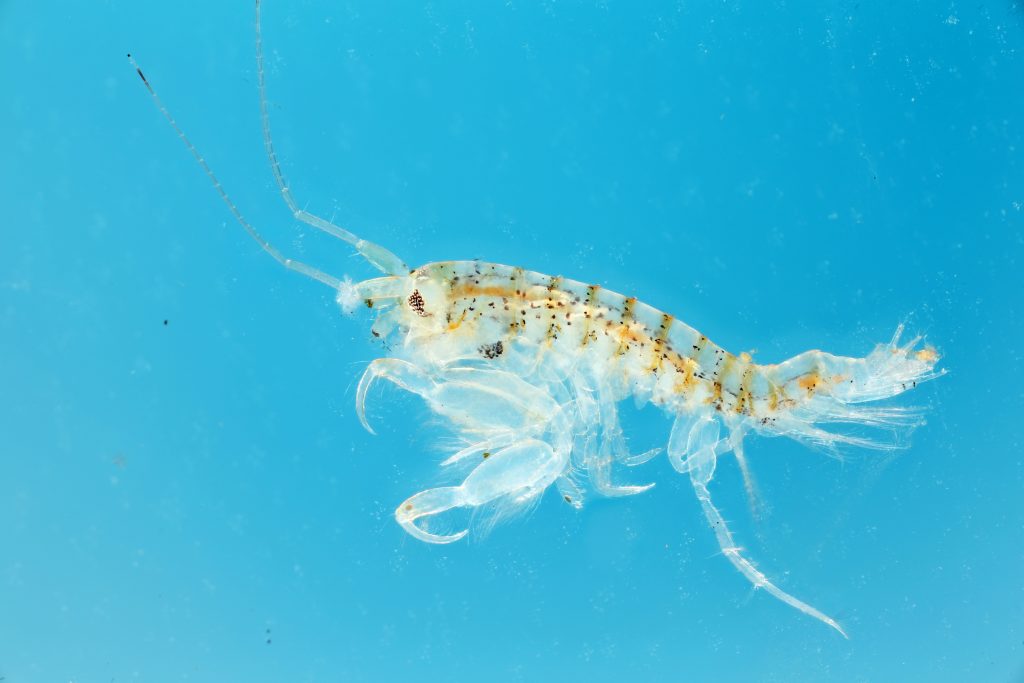- October 3, 2022
- No Comment
- 5 minutes read
Can a Tiny But Essential Ocean Organism Keep Pace with Climate Change? – UConn Today – University of Connecticut

Our websites may use cookies to personalize and enhance your experience. By continuing without changing your cookie settings, you agree to this collection. For more information, please see our University Websites Privacy Notice.
|
Trying to understand how well copepods can cope with warming oceans
Copepods, tiny crustaceans found in nearly every saltwater and freshwater habitat, offer valuable insights into how species adapt to climate change (Adobe Stock).
Copepods are among the most important organisms in the oceans. The millimeter-sized animals are food for many fish species and are therefore central to marine life. Marine biologists fear that climate change could affect small crustaceans in the future – and that this could decimate the most important food source for fish and many other marine animals.
A team from the University of Connecticut, the Geomar Helmholtz Centre for Ocean Research Kiel, and the University of Vermont is further investigating whether copepods can genetically adapt to changing living conditions over the course of evolution. They considered both the effect of higher water temperatures and ocean acidification. The work of the U.S.-German group is special because it was one of the first to expose marine animals to multiple stressors in the lab. The study is published in the Proceedings of the National Academy of Sciences (PNAS).
This research follows up on a previous study led by UConn researchers Hans Dam and Hannes Baumann from the Department of Marine Sciences and Michael Finiguerra from the Department of Ecology and Evolutionary Biology, that demonstrated these animals can indeed adapt quickly, but in a limited capacity, to ocean warming and acidification. Dam is also a co-author of this current study.
The results of this most recent study are cautiously optimistic. The team, led by Geomar researcher Reid Brennan and University of Vermont professor Melissa Pespeni, found through detailed genetic analysis that these small crustaceans can indeed adapt to new conditions over the course of about 25 generations – which corresponds to a period of just over one year, since several generations of crustaceans can mature in a year at moderate water temperatures.
The researchers found that as water temperatures rise and conditions become more acidic, gene variants become prevalent in the copepods’ genome that result in the animals being better able to withstand environmental stress. “These mechanisms help, among other things, to ensure that copepod eggs develop properly despite adverse environmental conditions and that important metabolic processes continue,” says Brennan.
Multiple stress factors amplify the effect
In its study, the team looked first at how ocean warming and ocean acidification each affected the animals on their own; and second, how the two interact. The comparison showed that warming has a significantly greater effect than acidification. This means that under warmer conditions, significantly more genes react, and variants shift in frequency. The effect was even greater when the researchers exposed the copepods to both stress factors – warming and acidification.
The experts made a disturbing discovery: One might have expected that under combined heat and acidification stress, those genes that react to heat and those that react to acidification would change, and both would simply add up. In fact, however, a whole series of other genes responded under double stress.
For copepods, this means that metabolic stress continues to increase and that it is likely to become even more difficult to adapt.
“Even if we know how individual stressors work, it is going to be challenging to predict how the organism will respond when, for example, oxygen or nutrient deficiencies are added to the mix,” says Pespeni. “One plus one doesn’t always equal two when it comes to global change stressors.”
Read the article
Read the article
Read the article
University Communications
universitycommunications.uconn.edu
[email protected] | (860) 486-3530

